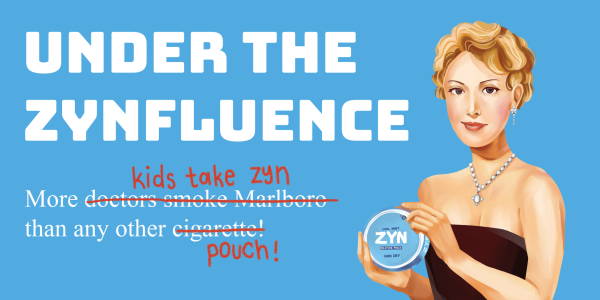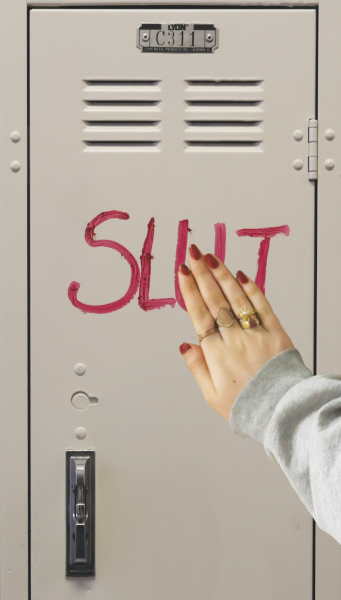Given or Received?
Cheating has been on the rise as a result of online school, constant academic pressure and overall stress. Students and faculty members reflect on school policies regarding assessments, the role of the Honor Board and its methods.
CAUGHT ON CAMERA: Sarah Rivera ’21, Ariana Pineda ’21, Simran Yogakumar ’21 and Natalie Barnouw ’21 participate in a staged photo
May 30, 2021
After completing her in-class essay, Betty* looked down at her phone and scrolled through the texts on her English class group chat. Betty realized that another member of the group chat had sent the essay prompt before the in-class essay was administered, when the students were not yet supposed to know it. Betty’s panic grew when she received an email from Dean of Students Jordan Church. Though Betty had not used the information she was sent on this group chat in her essay, she and her peers in the group chat had to appear before the Honor Board for receiving unauthorized aid.
Betty’s case was among the many brought to the attention of the Honor Board in the past year. Cheating and plagiarism on tests and assignments are not new problems; however, according to an email sent to upper school students Jan. 19, the Honor Board had already seen two times the amount of cases compared to the same time last year. While students have been taking tests on Zoom, many teachers have adopted open-note policies and other measures in an effort to reduce cheating.
Upper School Dean Sharon Cuseo said she is optimistic that cheating will decrease now that in-person school has resumed, but she thinks students will continue to cheat when desperate.
“Certainly the immediate temptations of the internet will decrease when that is no longer an option, but students who get desperate will still find ways to take shortcuts,” Cuseo said.
As Zoom classes have exacerbated the issue of cheating, some students including Betty have begun to look at ways in which modifications to the Honor Board or school policies could minimize cheating.
“I think the workload at Harvard-Westlake is really crushing, and we all really want to do well, so sometimes we all think cheating is the answer, when really if we had a better system in place and one that valued the mental health of students, I think we’d have a lot less cheating,” Betty said. “If there were a greater amount of extensions and teachers being cognizant of just how much work we have in relation to other classes and more communication between students and teachers, [it] would be really beneficial and would probably decrease cheating.”
Skylar Whitley ’23 said that continuing to allow open-note tests as school reopens will likely minimize instances of cheating.
“I think, honestly, just letting people use their notes during tests and gearing tests toward applying knowledge and using less memorization will make people less inclined to cheat,” Whitley said. “You know, you still need to actually understand the material, and if you let people use their notes, most people will feel more comfortable with what they’re doing and therefore feel less inclined to cheat.”
Prefect Council member Micah Gold ’22 also cited unreasonable expectations and procrastination as reasons why students cheat, proposing solutions that address these problems directly.
“Making different tests for different periods, clearly outlining what counts as cheating and sending students to the Honor Board [are all methods that teachers and the school could employ to limit cheating],” Gold said.
English Teacher Jocelyn Medawar said that though she recognizes these pressures, it is ultimately on the students to make the choice not to cheat and that no changes will stop everybody from cheating.
“The school [and] teachers can’t prevent cheating,” Medawar said. “That’s up to students. But we can work our hardest to avoid situations that could prove too tempting and to be sure that students know what forms cheating can take and that the best of us [aren’t] immune to taking a wrong turn. I always tell students not to sign the Honor Code without taking a moment to think about it each time. And if they can’t sign in good conscience, I tell them not to be afraid, but to talk to me.”
Cuseo agreed with Medawar that cheating will remain even if changes to school policies are implemented, but she said that there are certain measures the school could take to minimize the issue.
“While ultimately the decision to take a shortcut rests with the student, there are certainly ways the school can reduce the temptation, such as changing tests between periods or giving different versions of tests, even during the same period,” Cuseo said. “Or simply having students [leave] their phones on the teacher’s desk during assessments. And all of the policies on acceptable collaboration should be spelled out in the syllabus for each class.”
Betty also addressed the fact that many members of the student body know very little about the Honor Board.
“I found the experience [of going before the Honor Board] a little bit frightening, just because I didn’t really know that much about the Honor Board going into it, and I still don’t know that much about it, and I wish that the Prefect Council did a little bit more to make the Honor Board process more transparent,” Betty said.
Honor Board cases are kept strictly confidential for the privacy of those involved; in most cases, including Betty’s, students who come before the Honor Board are prohibited from sharing the details of their case.
Camryn Williams ’22 said that this can lead to a lack of knowledge among the student body about the process of going before the committee and what constitutes an Honor Board case.
“I think there should be more transparency between Prefect Council and the student body because the Honor Board system seems like some kind of secret society that no one is supposed to talk about,” Williams said. “It would be nice to know about how the process works.”
Michael Asemota ’22 agreed that the Prefect Council needs to communicate more with the student body about how the Honor Board works.
“For sure, there needs to be more transparency [between Prefect Council and the students],” Asemota said. “I have no idea how the Honor Board really works or what happens and the decision making [process]. If you asked me what the Honor Board does, I would have to say, ‘Oh, they give out punishments to students.’ That’s all I know.”
However, Medawar expressed discomfort at the idea of making the Honor Board process more transparent, as it could put the confidentiality of the program in jeopardy.
“I think that students are educated about the Honor Board when they enter the Upper School,” Medawar said. “I’m not sure what more transparency would look like, but I do feel that public information should be balanced with privacy issues. A student should be allowed to make a mistake in terms of academic integrity and move on without having their privacy violated.”
Gold shared Medawar’s opinion about the possibility of educating students more about the Honor Board, saying that on the Honor Board they value confidentiality over transparency with the student body.
Betty expressed concerns with the way that the Honor Board treats certain issues, such as her own case, which involved unintentional cheating, as equivalent to instances of deliberate plagiarism or cheating. Since she did not use the aid she received on the English essay, Betty did not face any consequences, but she said that she felt frustrated by the fact that the Honor Board process seems to be designed to scare students who come before it, instead of working with students.
“I received an email from Mr. Church saying that he wanted to talk to me about the [incident] in English, with no mention of the Honor Board, and then once I was in the meeting, I learned that I was being ‘Honor-Boarded’,” Betty said. “Speaking to the Honor Board itself was a little frightening. There were so many people in the Zoom room, and I guess I think it is good that the Honor Board exists for those who are actively cheating, but for those who just get caught in the middle of things, I wish there was a less frightening process.”
Asemota also said that he thinks it is important that there are student representatives on the Honor Board but that Prefect Council isn’t necessarily representative of all of the students who come before the committee.
“Even though teachers might say they understand because they once were students, a lot has changed since they were students, so it’s good that there are students on the Honor Board,” Asemota said. “But just because there are students [on the Honor Board] doesn’t mean they are representative of the whole community.”
On the whole, though, students said that even though they believe the Honor Board system can be improved, having a committee with student representatives allows for more appropriate consequences. Gisele Stigi ’22 said she thinks having student representatives also builds trust between the Honor Board and the upper school body.
“I feel like the students are able to trust the consequences a lot more,” Stigi said. “I think students are able to understand the consequences [better] coming from one of their peers than they might from a teacher or authority figure.”
*Names have been changed.










































